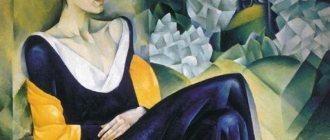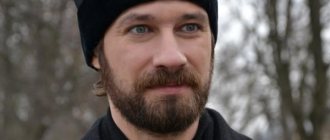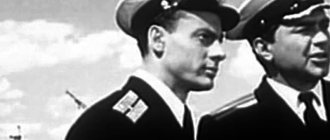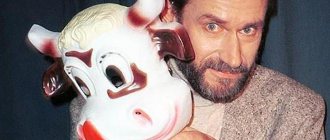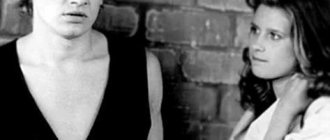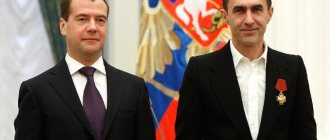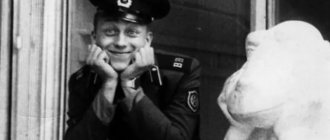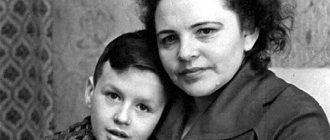Views: 2,751
Nikolai Eremenko was the conqueror of women's hearts on the screen. He continued to be the same in real life.
Nikolai Eremenko was born in 1949 in Vitebsk, Belarusian SSR. His father, Nikolai Eremenko Sr., is a famous actor, People's Artist of the USSR. Mother is a famous theater actress - Galina Orlova .
Childhood, war and three years of fascist camps
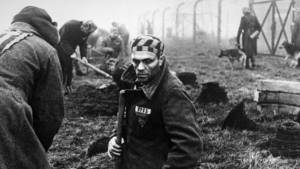
Nikolai Eremenko - Sr. (center) in the role of Lieutenant Alexei Pavlov in the feature film “People and Animals” by Sergei Gerasimov (1962)
Nikolai Eremenko was born on June 17, 1926 in Novosibirsk. His father was a military man, his mother worked in the prosecutor's office. They lived in Siberia for only a few years: due to their father’s service they had to move frequently. Soon after the birth of their son, they divorced. The father received a new assignment and left for another city, while the mother and Nikolai remained in Novosibirsk.
The future actor enjoyed performing since childhood: he performed small skits at home, parodied acquaintances, was the star of creative evenings at school and often played in holiday performances. In 1940, he graduated from the seventh grade and entered vocational school No. 1 to become a turner. The family did not have enough money, so in his free time Eremenko worked part-time at a factory.
When the Great Patriotic War began in 1941, Nikolai Eremenko was 15 years old. He wanted to volunteer for the front, but did not pass the military registration and enlistment office due to his age. Then he forged a passport and added three years to himself. Eremenko was sent to urgent courses for junior lieutenants in Novosibirsk, and at the beginning of 1942 - to the front line as part of the 11th Cavalry Corps. In the summer of the same year, during the battle near Vyazma, he was surrounded and then captured by the Germans. Eremenko was taken to a camp near Stuttgart. There was no food on the way: the soldiers ate roots, leaves and potatoes from unharvested fields. Conditions in Germany were harsh. The prisoners worked in the mines seven days a week, sometimes at night. Nikolai Eremenko tried to escape several times, but was unsuccessful. He was released shortly before the victory, in 1945. However, from one camp he immediately ended up in the second - a filtration camp, already organized by the NKVD. Eremenko was checked for a long time, and then reinstated in rank. In the fall of 1945 he returned to Novosibirsk.
The beginning of an actor's career: from an employee of a cultural center to a leading actor
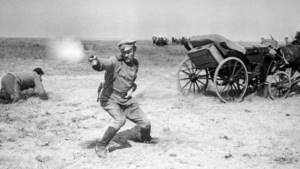
Nikolai Eremenko - Sr. (center) in the role of Rusanov in the feature film by Alexei Speshnev, Vladimir Korsh-Sablin and Pavel Armand “Moscow - Genoa” (1964)
When Nikolai Eremenko returned to his hometown, his mother was not there. For three years she knew nothing about the fate of her son, decided that he had died, and after the war she moved to the village of Beshenkovichi, Vitebsk region, to live with relatives. Nikolai Eremenko went after her. In Belarus, he got a job at the regional House of Culture: he organized poetry evenings and concerts for local residents, was responsible for the budget and looked for teachers for circles. Soon Nikolai Eremenko headed the House of Culture. He often helped out amateur theater directors and played in performances when there were no takers. At the end of 1946, at a review of creative groups in the region, the famous actor Alexander Ilyinsky noticed Eremenko on stage and invited him to the school at the Second Belarusian State Theater. Yakub Kolas (now the National Academic Drama Theater named after Yakub Kolas). The young artist entered there in 1947.
Famous Belarusian actors worked with the students: Pavel Molchanov, Timofey Sergeichik, Lyubov Mozalevskaya, Elena Rodzyalovskaya and others. They taught stage speech and movements, gave lectures on the history of theater and showed acting techniques. Nikolai Eremenko was one of the best students. He was easily given both comedic and dramatic roles. Immediately after the graduation performance “Old Friends” about recent schoolchildren in the war, the actor was invited to the Second Belarusian State Theater named after. Yakub Kolas.
At first, Nikolai Eremenko was approved only for episodic roles. He was involved in the plays “Front” based on the play by Alexander Korneychuk, “Yegor Bulychev and Others” based on Maxim Gorky, and “The Ruined Nest” based on Yanka Kupala. However, soon the theater director Alexander Skibnevsky began to trust the actor with the main characters. In 1950, Eremenko played the Bulgarian Dmitry Insarov in the play based on Turgenev’s novel “On the Eve”. Then there were the roles of the revolutionary Azorich from “The Light of the East” and the tough director of the tractor plant Dmitry Bakhirev from “The Battle on the Road” based on the work of the same name by Galina Nikolaeva. In 1955, the actor was awarded the title of Honored Artist of the Belarusian SSR.
“The only and best performer”: work in cinema and a letter to Sergei Gerasimov
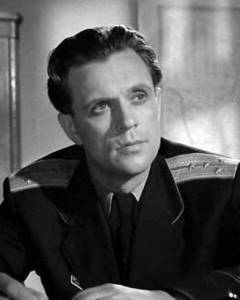
Nikolai Eremenko - Sr. in the role of Nikolai Radevich in Richard Viktorov’s feature film “A Sharp Turn Ahead” (1960)
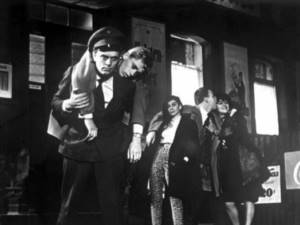
Nikolai Eremenko - Sr. (left) in the role of Lieutenant Alexei Pavlov in the feature film “People and Animals” by Sergei Gerasimov (1962)
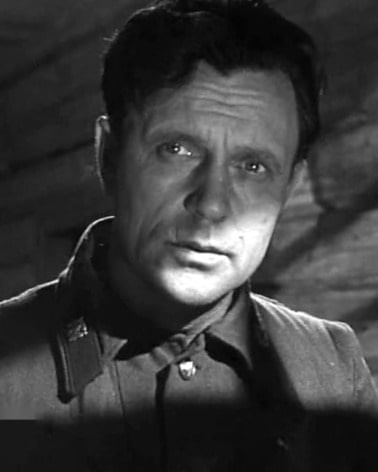
Nikolai Eremenko - Sr. in the role of Anatoly Ivanovich in the feature film by Valery Isakov and Radomir Vasilevsky “Pursuit” (1965)
In 1959, Eremenko was invited to the National Academic Theater. Yanka Kupala, and he moved to Minsk. And six months later, the actor already played the main character in the play “Konstantin Zaslonov”. In the story, in the occupied territory, railway engineer Zaslonov began collaborating with the Nazis. He was despised by his colleagues and family, but no one suspected that he was planning to blow up trains with German weapons. The production attracted full houses.
The salary in the theater was small, so Nikolai Eremenko was looking for a part-time job. Colleagues advised him to send a questionnaire with a photo to Belarusfilm. In 1960, the actor was invited to the movies to play the role of a traffic inspector in Richard Viktorov’s drama “A Sharp Turn Ahead.”
In 1961, Nikolai Eremenko read in Literaturnaya Gazeta the script for Sergei Gerasimov’s future film “People and Beasts,” which was written by the director’s wife Tamara Makarova. This was the story of the commander of the Red Army: during the Great Patriotic War he was captured by the Germans, and after 1945 he did not return to his homeland because he was afraid of ending up in the Gulag. After many years of wandering around the world, the officer finally went to see his brother in Sevastopol. Nikolai Eremenko was so impressed by the script that he re-read the text several times. He recognized himself in the main character and wrote a letter to Sergei Gerasimov with a request to invite him to audition. The director in the book “Life, Films, Controversies” recalled: “At the very first meeting, barely shaking the hand of a completely unfamiliar person, whom I had only seen once in Minsk in one of the performances, I saw in him the only and best performer of the role of Pavlov. And I didn’t look for anyone else for this role.” The film was shot in the GDR and Cuba. Eremenko’s partners on the set were famous actors Tamara Makarova, Zhanna Bolotova, Vitaly Doronin and others.
I must say that I was not disappointed in him for a minute - there was a happy coincidence of human nature and the role, which, in my opinion, alone prepares the success of all the actor’s work in cinema.
Sergey Gerasimov. "Life, films, controversies"
In 1962, the film “Men and Beasts” was released. Little was written about the film in the press: the discussion of the topic of Soviet prisoners of war was monitored by censorship. However, Nikolai Eremenko began to be recognized on the streets, and more and more spectators came to his performances. During this time in the theater, he played the main role in Shakespeare's comedy All's Well That Ends Well. On stage, the actor appeared in the image of the noble Count Bertram, who has feelings for the daughter of a simple doctor, but is afraid of an unequal marriage. Soon the premiere of the production “Anxious Happiness” took place based on the cycle of stories of the same name by the writer Ivan Shemyakin. The actor played the main role: a young student who went to war.
In 1964, Eremenko again starred in films, this time in the film “Moscow - Genoa” about a Soviet diplomat. The actor was approved for the role of the emigrated White Guard Rusanov, who is obsessed with the idea of revenge on the Bolsheviks. Soon after the premiere show, the artist received two new offers at once: to play an air regiment commander in the film about young pilots “Flying Days” and a huntsman who pursues a poacher in the film “Pursuit”. Both films were shown on screen in 1965.
First successes
Many considered Eremenko a real darling of fate. Nikolai was born on February 14 - Valentine's Day. From birth, he was doomed to the love of others and great success. Eremenko was born into a family of actors, so his childhood was spent behind the scenes. Without much effort, he entered VGIK.
Why the Siri voice assistant has become worse than its competitors
Star Wars Battlefront 2 servers could not cope with the influx of new users
I made a cozy hammock for my cat out of a cardboard box: step-by-step instructions
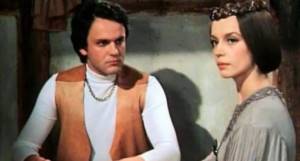
Many believed that the father, who was a famous actor, played a big role in this. During his studies, Nikolai was Sergei Gerasimov’s favorite, and many students dreamed of taking his course. But Nikolai was not particularly enthusiastic about his studies. He regularly skipped classes, but moved on to the next course. Nikolai began acting in films during his student years. He got such outstanding roles that one can only dream of. In 1969, Eremenko starred in Gerasimov’s film “By the Lake.” During filming, his partner on the set was Vasily Shukshin.
Personal life and hobbies of the actor
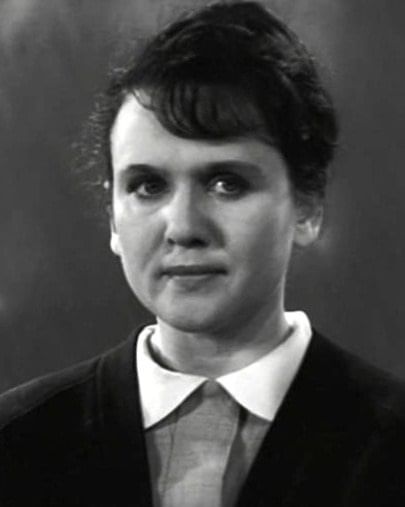
Galina Orlova - wife of Nikolai Eremenko - Sr. - in the role of Marya Ivanovna in the feature film by Vladimir Streltsov “Pavlik” (1964)
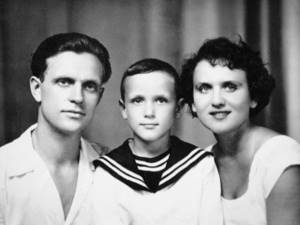
Nikolai Eremenko - the eldest with his wife Galina Orlova and son Nikolai. Photo: persons-info.com
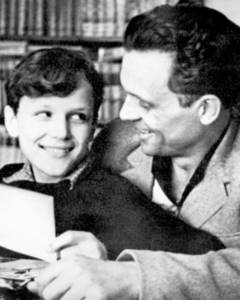
Nikolai Eremenko - the eldest with his son Nikolai. Photo: kino-teatr.ru
Nikolai Eremenko met his wife, Galina Orlova, at an acting course at the Second Belarusian State Theater. Yakub Kolas. She was often his partner in educational performances. After graduation, the young artists were hired, and they began to spend a lot of time together. Soon Eremenko and Orlova got married. Sometimes the couple worked part-time on weekends: they went to collective farms with small concerts. In 1949, a child was born into the family. Son Nikolai spent his entire childhood behind the scenes of the theater and wanted to repeat the professional path of his parents. He became no less popular than his father.
Galina Orlova in the book “Three Me” wrote about her husband: “You are happy because people have always needed you! The telephone in our apartment rings from morning until late evening... your word sometimes causes a wide resonance. They write to you, call you, strangers come up on the street, silently shake your hand and silently leave.”
In his free time from stage and filming, Nikolai Eremenko went fishing or watched football matches - the actor was a fan of Dynamo Minsk. After the release of the film “Men and Beasts,” the team even invited him to start one of the matches and be the first to hit the ball.
Popularity and success
Popularity and success came to the actor early. In the cinema, Eremenko immediately gained the reputation of a hero-lover who easily wins hearts. This was true off the set.
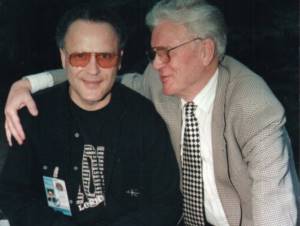
The handsome handsome man was very popular among the female half. What can I say, all the women in the country raved about the actor. It is not surprising that crowds of fans and fame turned Nikolai’s head.
Cambridge: miniature installations that make you think about other worlds
A piece of graffitied wall sold for six figures in the UK
Scientists extract DNA from the bone of a cave bear that lived 360,000 years ago

